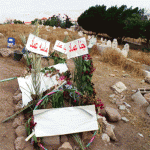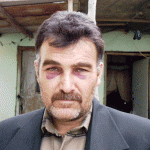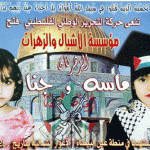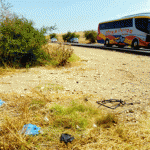International Solidarity Movement
5 May 2010

We stopped by the roadside at the spot where the two little girls had been killed. Their blood still stained the cushion on which they had been sitting, fragments of the military jeep which had rammed their father’s tractor still littered the ground. Janaa Fakha (8), her sister Maasa (5) and their brother Hussein (9) never saw what hit them as they waited for their father to take them from the family fields to their home in the small village of Al Ain al Baida in the northern Jordan Valley. Al Ain al Baida (the White Spring) is one of the few remaining Palestinian villages here. Its inhabitants scratch a living from what remains to them of their lands in this fertile and beautiful area.
That April day Emad Fakha had taken three of his four children to help in the fields after school, something they enjoyed, a treat. The children had climbed into the “basket” on the ground at the rear of the tractor, ready to be lifted up. Emad was preparing to start the motor when an Israeli military jeep swerved off the road, at speed, and rammed into the tractor from behind. While Hussein was thrown clear and suffered only a broken leg, the little girls didn’t stand a chance. With the body of one sister draped obscenely over its front bumper, the jeep reversed for five or six metres and then rammed once again into the tractor. What might have been a tragic accident is thus revealed for what it was – a cold-blooded murder.
Their jeep undriveable and so unable to escape, the soldiers threatened Emad with their rifles. More soldiers arrived but it was 25 minutes before the Israeli police reached the scene. The soldiers claimed that it was “an accident”, but Israeli citizen Eliazer Salam, from the settlement at Yama, who had witnessed the entire incident from his car, testified that the jeep driver had not applied his brakes at any stage and had, indeed, swerved off the road and accelerated into the tractor.
The jeep’s driver was arrested but there has been no news that he is to face any charges in a court of law. When I asked the family whether there would be an inquest (explaining that this was the usual procedure in Western, democratic countries) they didn’t understand the term. They have no recourse to the protection of the law, as we know it. Far from protecting the civilian population of the territories which they occupy, as required under international law, the Israeli military brutalises and preys upon a helpless people.
Recent similar incidents in the Nablus region – at Awarta and in Jenin – where Israeli military vehicles have been used to run down pedestrians and ram a civilian car, with fatal consequences, seem to point to an emerging pattern. The psychopathic tendencies of certain members of the Israel Defence (sic) Force have found an outlet.
Meanwhile, a single, small grave has been dug in the graveyard at Al Ain al Baida. It houses the remains of two small sisters, their severed limbs and bodies buried as one, together forever under the sun, clouds and rain of their beloved Palestine.




